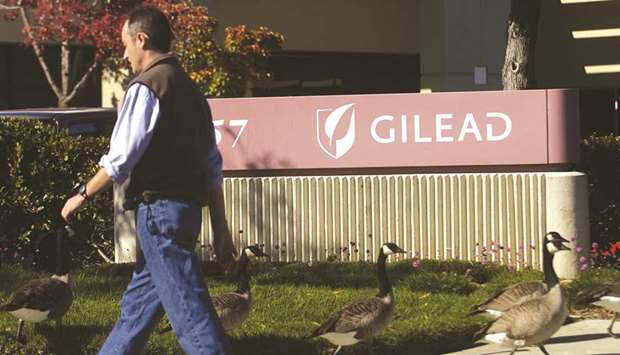Gilead Sciences Inc’s $5.1bn investment in Galapagos propelled the Belgian biotechnology company’s stock to a record while sending a positive signal to the rest of the sector in Europe, where the industry has lagged the US.
The amount Gilead is investing tops the $4.7bn that has flowed to European pharma and biotech companies this year in mergers, acquisitions and share investments. It compares with a whopping $240bn in the US, a number that was boosted by a handful of mega deals, Bloomberg data shows.
“I hope it puts the whole European biotech sector in a different light,” Onno van de Stolpe, Galapagos’s founder and chief executive officer, said in a telephone interview. “It’s massive funding.”
US investors have been more willing to finance early and mid-stage drug development, leading to the creation of biotech centres in Boston, San Francisco and other areas that are unrivalled in Europe.
The UK’s Life Science Strategy, released in 2017, acknowledged the need to bolster the sector, which recently lost key backing when money manager Neil Woodford, a frequent investor in biotechnology, froze redemptions in his LF Woodford Equity Income Fund.
It helps that Gilead’s new CEO spent more than three decades working for a Swiss pharma company, putting him in a position to know what’s happening across the region – and which targets are worth exploring.
Dan O’Day took the reins in March at Gilead with a mission to bolster the San Francisco giant’s drug pipeline after years spent at Roche Holding AG. Gilead is in danger of becoming a victim of its own success after launching its best-selling hepatitis C franchise, which includes some of the top drugs of all time. Sales from those therapies have since declined due to increased competition.
Under the agreement, Gilead will pay $3.95bn upfront to Mechelen, Belgium-based Galapagos and invest $1.1bn to raise its stake to 22% from 12.3%, the companies said in a statement. The investment, at €140.59 a share, is 9.7% higher than the Belgian company’s closing price on Friday. Galapagos soared as much as 18% yesterday, reaching a record €149.55 a share in Amsterdam trading.
Galapagos, which focuses on diseases that have to do with inflammation and a kind of internal scarring known as fibrosis, will use some of the money to hire more scientists, doubling its research and development staff to 1,000 people, according to Van de Stolpe.
With more funds “we can now do more of what we’re good at,” he said.
The deal establishes a strong research base in Europe, where Gilead has historically not been as active, according to O’Day.
“In no way is this the only thing that we’re looking at or the only thing that we’re going to do,” he said in an interview. “You can look at this like it’s the beginning.”
The upside scenario following the expanded Gilead pact would be a full takeover, though cash from the deal leaves Galapagos well-funded to keep developing assets.
The pact includes a provision in which Gilead’s stake could rise to almost 30% if Galapagos shareholders approve two warrants. The companies were already partners on an experimental drug for rheumatoid arthritis. That drug, filgotinib, hit its main goal in a late-stage study in March.
O’Day had a reputation as a dealmaker while at Roche, likely one of the reasons he was selected for Gilead’s top job at a time when the company needs to look externally to drive growth.
He said that in this case, the companies opted for a partnership-style deal rather than a full takeover because full mergers can often destroy innovation as research and executive teams disband. Roche’s deal philosophy is much the same with the Swiss giant opting to leave many its units independently managed, even when it owns them in full.

A man walks past Gilead Sciences offices in Foster City, California.
